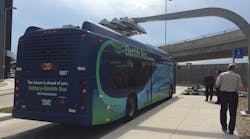FCM grant to help Brampton, Burlington transit fleets transition to lower emission vehicles
The Federation of Canadian Municipalities (FCM) has awarded the Canadian Urban Transit Research and Innovation Consortium (CUTRIC) a total of C$253,000 (US$194,170) to assess lower emission technologies for transit fleets in the cities of Brampton and Burlington, Ontario.
The funds are being provided through FCM’s Green Municipal Fund, which is funded through an endowment by the government of Canada. The Green Municipal Fund aids local governments with their efforts to switch to sustainable practices through financing, resources and training.
“Today’s announcement of funding for clean transportation in Brampton and Burlington, Ontario, is a key step toward our government’s priority to support Canadians in reducing pollution, enhancing our communities and furthering our innovation in clean technologies,” said Canada’s Minister of Natural Resources Jonathan Wilkinson.
CUTRIC will use C$175,000 (US$134,300) of the funds to study the feasibility of using zero tailpipe-emission buses on Brampton Transit’s route network. Brampton is part of the Pan-Canadian Battery Electric Bus Demonstration and Integration Trial, which is led by CUTRIC and aims to demonstrate interoperable charging and operation of battery-electric buses. The city launched eight battery-electric buses into service in May 2021 as part of the demonstration trial.
“This $175,000 investment will directly support the next level of sustainable transit in Brampton and in Canada, as Brampton Transit purchases up to 450 zero-emission buses for Brampton’s roads over the next five years. Brampton is a Green City, and together, we will reduce our carbon footprint and improve the quality of life in our community,” said Brampton Mayor Patrick Brown.
CUTRIC will use C$78,000 (US$59,860) to analyze the techno-economic and life-cycle emissions associated with transitioning Burlington Transit’s fleet to fuel cell electric buses (FCEBs) across all routes and blocks.
Both studies will be carried out using CUTRIC’s predictive modelling tool, RoutΣ.i™, which incorporates operational conditions such as route maps, transit schedules, weather and passenger-loading to determine the feasibility and benefits of adopting ZEBs or FCEBs based on existing technology. In addition to Brampton Transit and Burlington Transit, the RoutΣ.i tool is being used on Cornwall Transit, Toronto Transit Commission and York Region Transit as part of the government of Ontario’s Climate Change Action Plan.
“Humans today mostly live in cities. Cities should lead the way in addressing climate change and planning for our future in a climate changed world. CUTRIC is proud to work with cities like Brampton and Burlington. These cities are burgeoning hubs of innovative thinking around climate action. The time is now to transform the country’s infrastructure and low-carbon mobility landscape,” said CUTRIC President and CEO Josipa Petrunic.

Mischa Wanek-Libman | Group Editorial Director
Mischa Wanek-Libman is director of communications with Transdev North America. She has more than 20 years of experience working in the transportation industry covering construction projects, engineering challenges, transit and rail operations and best practices.
Wanek-Libman has held top editorial positions at freight rail and public transportation business-to-business publications including as editor-in-chief and editorial director of Mass Transit from 2018-2024. She has been recognized for editorial excellence through her individual work, as well as for collaborative content.
She is an active member of the American Public Transportation Association's Marketing and Communications Committee and served 14 years as a Board Observer on the National Railroad Construction and Maintenance Association (NRC) Board of Directors.
She is a graduate of Drake University in Des Moines, Iowa, where she earned a Bachelor of Arts degree in Journalism and Mass Communication.






